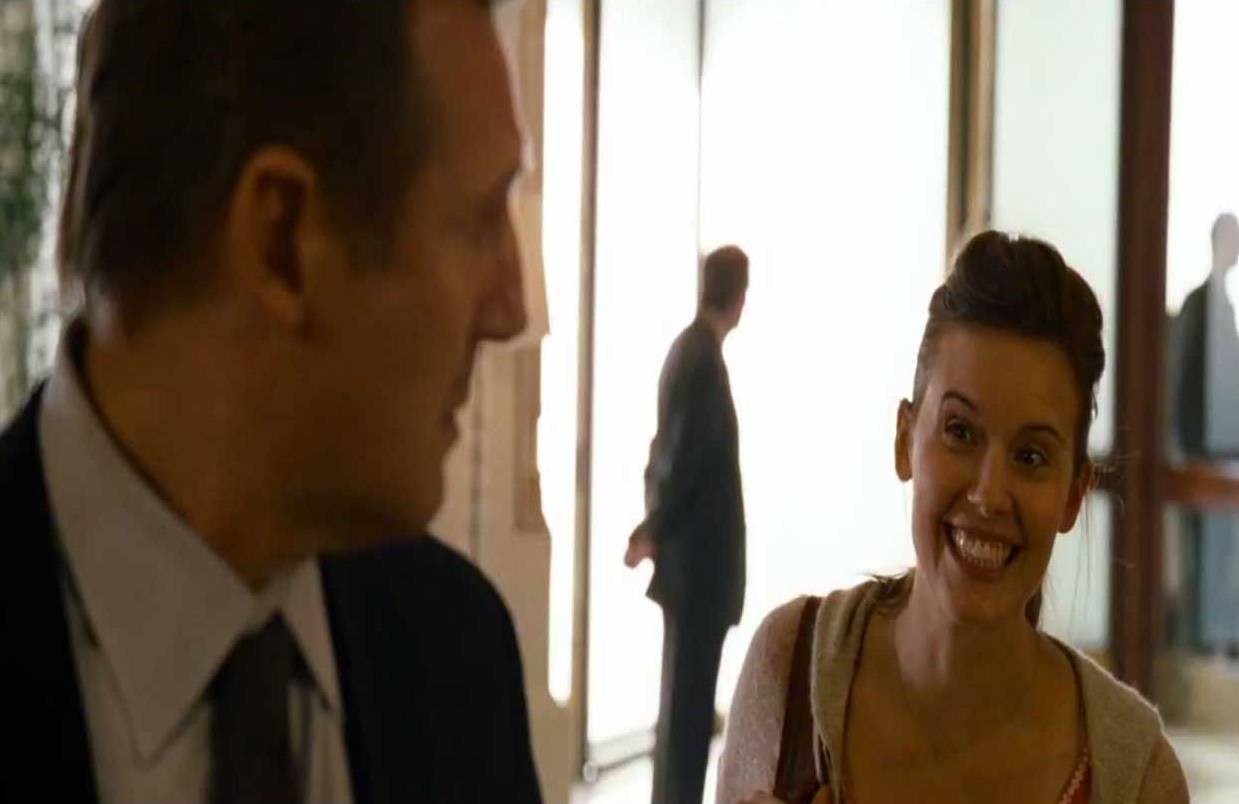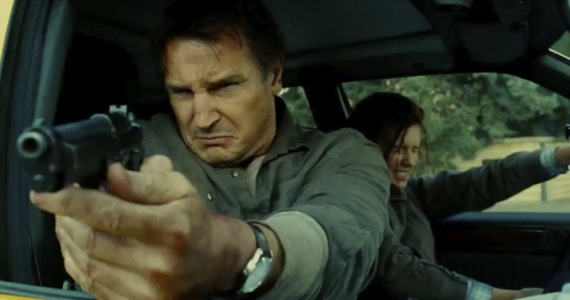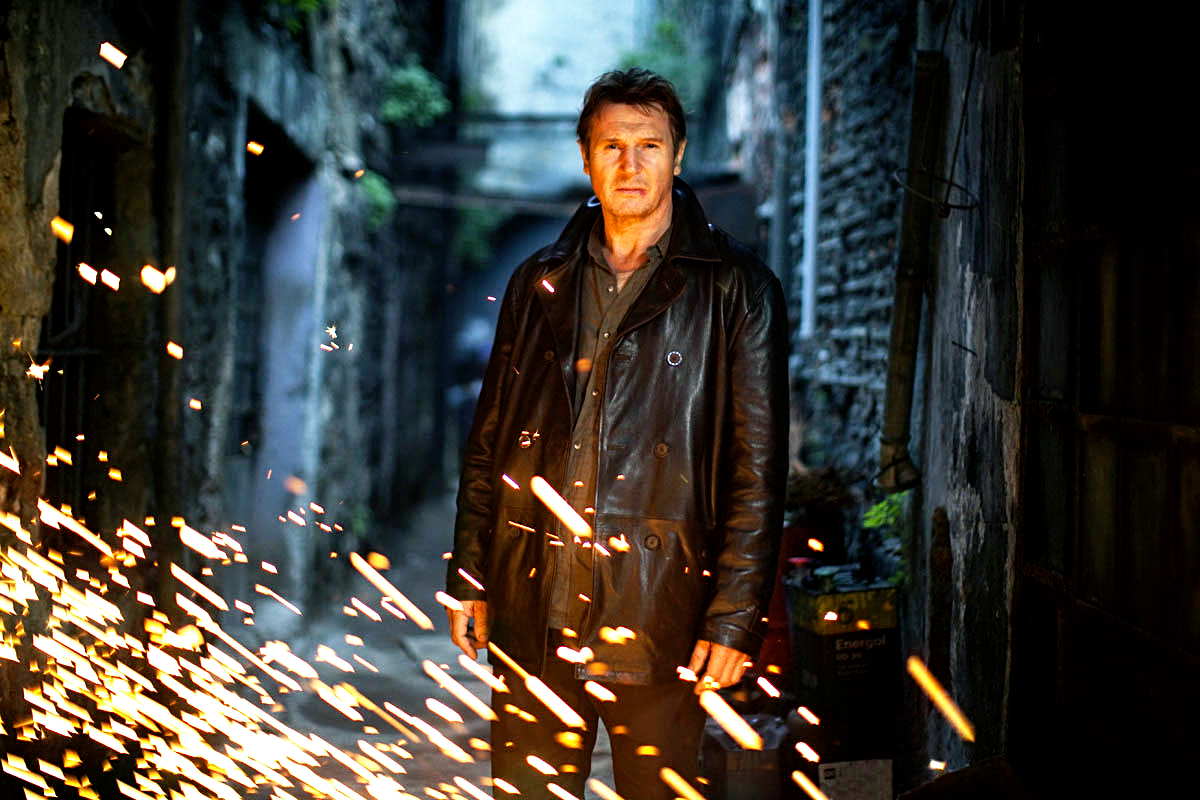|
After the
events of the first Taken movie,
Bryan Mills (Liam Neeson) is performing a security mission in Istanbul.
He is
surprised to be met by his daughter Kim (Maggie Grace) and his ex-wife
Lenore
(Famke Janssen) at the hotel, who has recently separated from her own
partner.
They've come to visit him, although he is still extremely cautious and
protective
of his family. Bryan is also unaware that the bad guys from the first
movie are
seeking revenge for the death of their brothers and sons at his very
hands. He
had to free his daughter from a human trafficking organisation by
killing these
men. Now they are prepared to ambush him in Istanbul by interrogating
someone
that knows him. While Bryan and Lenore leave Kim at the hotel, they are
stalked
by the evil Albanians and eventually captured. Bryan must communicate
with his
daughter over the phone to try and determine his own location, escape
and then
finish the baddies once and for all.

If Taken 2 is not one of the worst films
of
the year because of its primitiveness and xenophobia, then it is
because it is
an over-produced bit of tosh, somehow more mindless and insignificant
than its
predecessor. There is nothing at stake in this film, no afterthought
and no one
to care about. It is so numbingly ingrained in a formula and signposted
at
every angle that at the end of its meager ninety minutes, it feels like
nothing
more than incidental. The film's production notes are hilarious. They
praise
the original as "one the most successful and relatable action thrillers
of
recent years" and that audiences identified with Bryan's desire to
protect
his family. It's easy to forget how many parents are secretly ex-CIA,
paranoid
killing machines. Neither of the Taken
films are particularly concerned about family or paternity. That
wouldn't be manly enough for this series. It is simply
a continuation of Hollywood's unimaginative and archaic revival of the
types of
action films that were made in the 1980s under the Age of Reagan.
Violent actions
films of that bygone era were bred from the political view that one
person,
separate from government or law enforcement, could save the world. The
likes of
Stallone, Schwarzenegger and Eastwood were king. But part of why
Eastwood and
Schwarzenegger have survived this long, post-Reaganism, is through
self-reflection. Schwarzenegger's acting was never his strong suit, but
comic
timing was, eventually learning to parody
himself. The genre became so laughably over the top that the violence
was, to
many people, funny. And as Eastwood's politics have moved from
right-wing to
less conservative views, his films have appropriated this change. His
anti-Western Unforgiven (1992) saw
him hang up his six-shooter, reflecting on how violence shapes a
person, while Gran Tornio (2008) showed that manhood
is bred from sacrifice, hard work and self-respect, not body counts.
However, despite
the magnitude of various political changes and events, Hollywood in its
ongoing
creative rut is still intent on reviving the action genre, recycling
and
repackaging storylines and old stars, often without humour or blood.
The Taken series, highly derivative of
Schwarzenegger's Commando (1985),
epitomises this lethargy and strive towards decadence
by offering nothing but senseless killing, if only to appease video
game fans,
with countless goons being barrelled over like bowling pins, bookended
by
cringing American hokum.

It
matters not that Olivier Megaton has replaced French director Pierre
Morel for
this sequel. The template of the first film is lazily copied, retaining
its
uncomfortable fascist undertones. But
if Liam Neeson's Bryan was originally played with conviction, the
character now
seems possessive and frankly, creepy. Never mind that Kim travelled
overseas
and survived the wrath of human traffickers (she barely shows any
aftershocks
from the events of the first film). Bryan discovers an even bigger
revelation
about his daughter: she has a boyfriend! This
leads to some pointless and downright awkward scenes where he reveals
that he
placed a GPS tracking device in her phone to locate her at her new
bloke's
house. This is followed by Lenore's insistence that he doesn't run a
background
check on the poor guy. I didn't know whether to laugh or be horrified.
The film
doesn't improve once the baddies arrive and the gunfights begin in
Istanbul.
The film might sidestep condemning Islam and Muslims specifically, but
that
doesn't stop its grating xenophobic attitude of making all the baddies
fat,
balding, scruffy, barbarians, whose sole purpose is to torment those
poor
Americans. Damn foreigners!

This
untimely attitude, uncomfortable considering recent film-related
violence
against the West, is compounded by a lack of context. The first film
saw
Bryan's daughter as a smaller component of a larger scheme. Now the
narrative and the locations are repetitive and contained. It drastically
limits
the scope of the story and the action. Everything that happens is
either
absurdly predetermined or a blur. How lucky is Bryan that his captors
only take
him so far that he can still determine his location from the sound of a
grenade?
It's a good thing he packed those maps and hidden microphone so his
daughter
can determine where he is. Also, beware any bearded men hiding behind
newspapers.
If you're watching the film expecting a bloodbath you'll be
disappointed too. All
of the action scenes are distractingly over-edited, amateurishly
photographed
and near bloodless. But no matter, at the end of the day the most the
Mills
family has to worry about is driving lessons and the number of
milkshakes
they've ordered at the local diner.
|